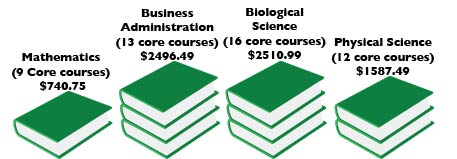The arrival of spring registration once again has students expressing frustration over paying for next semester’s textbooks as professors seek cheaper alternatives to relieve anxiety.
STRUGGLES TO SAVE MONEY
Sophomore elementary education major Briana Valdez already feels stressed from the thought of all the course materials she will need to buy in her future language classes in order to graduate with a Spanish minor. This semester, Valdez spent about $271 total, almost half of it coming from an access code that provides online vocabulary and listening activities for Spanish II. She deems the price unreasonably high.
“A lot of the things that they had on the access code is very easy for a teacher to come up with without us having to pay $110 for something that I could find online probably for free,” Valdez said.
Biola Store manager Melissa Castellano empathizes with students like Valdez as she continues to work with eFollet to source as many used and rental books as possible. Unfortunately, prices of brand new books and access codes are solely determined by the textbook publishers that the faculty member chooses. Although professors have full academic freedom to choose the textbooks they desire, publishers often only offer the newest and most expensive editions to the student store, preventing professors from accommodating students who want the older, cheaper versions.
Because of this, students in majors such as science and business, lean towards the online bookstore to buy used, rent new or rent used textbooks, which remains the most popular and least expensive selection.
Students cannot always rent all of their course materials, however. Many professors commonly sell course packs exclusive to the bookstore, yet still aim to keep the costs low.
PROFESSORS MAKE EFFORTS
Mathematics professor Joseph DiMuro took one step further in his calculus classes and provided an open education resource to students this semester for the first time. Students now receive access to view and copy certain online textbooks, articles and other media at no cost. Meanwhile, students taking DiMuro’s other courses such as upper division Abstract Algebra will have to stick to their $200 textbook as he continues to search for more online quality sources.
“I am trying to do my part to keep my students’ textbook costs down, but it is a lengthy process.” DiMuro said.
To lower expenses, seniors like biological science major Eliabe Gizaw have learned from experience how to purchase or rent textbooks for the best price. Although his textbooks added up to over $500 at the bookstore this semester, he managed to obtain them all for about $250, largely through Amazon and other upperclassmen.
“I’m trying to save the most money when I’m buying textbooks,” Gizaw said. “The prices [from Amazon] are not comparable.”
Recognizing these concerns, the Biola Store also provides a price match offer to help relieve student finances and to attract more customers.
“We’re really aware of the rising costs in textbooks and the rising cost of education in general, so we’re doing everything we can,” Castellano said.








